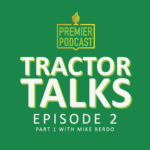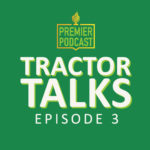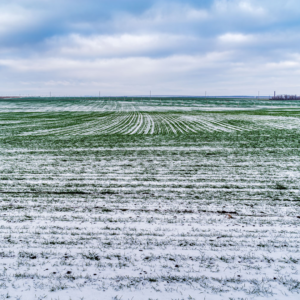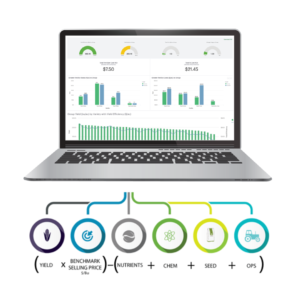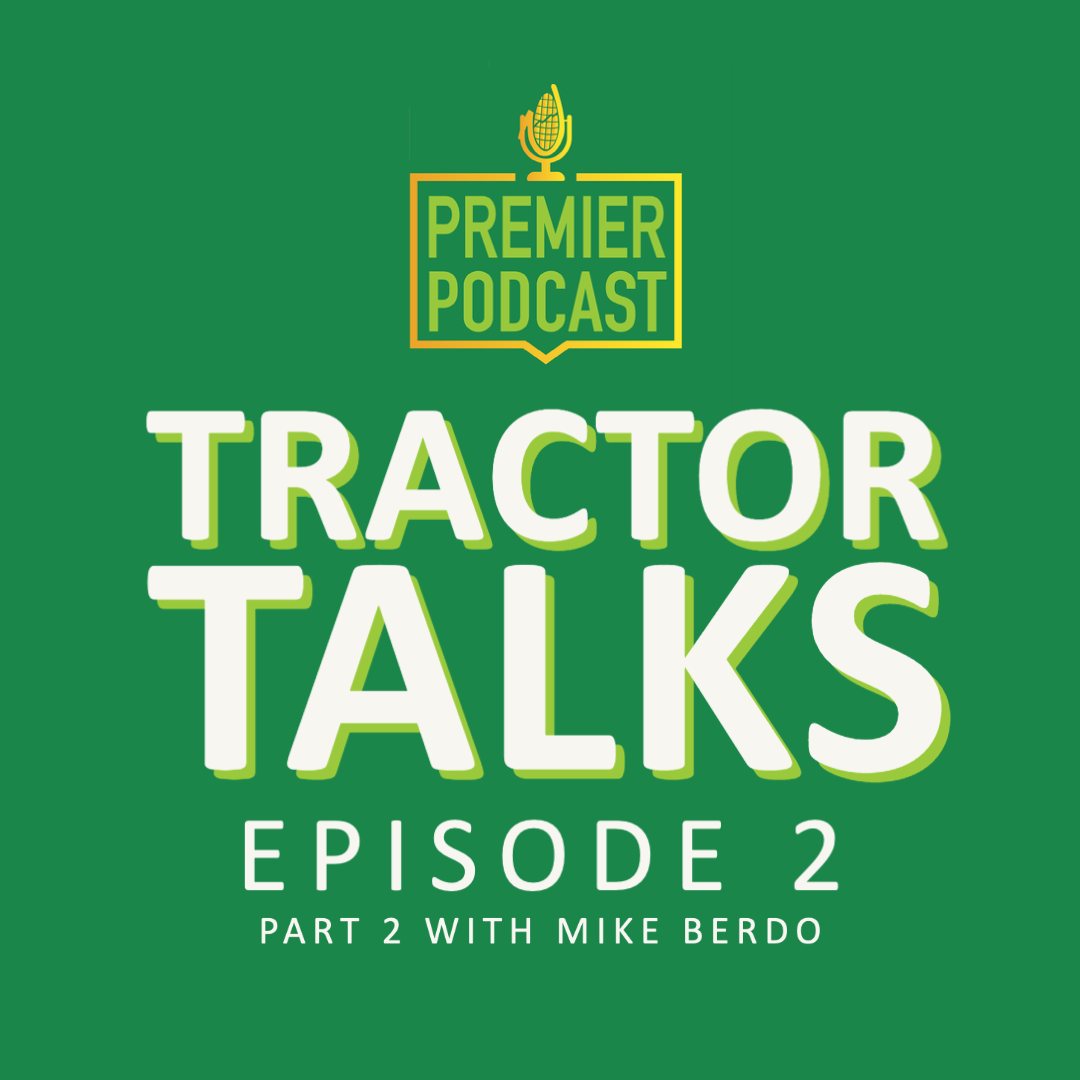
Tractor Talks is a mini series here on the Premier Podcast where we join growers in their tractor cabs during the spring and hear their honest opinion on precision ag.
This series is hosted by Katie McWhirter, Manager of Training and Development at Premier Crop Systems.
If you are enjoying the show, tweet us at @PremierPodcast.
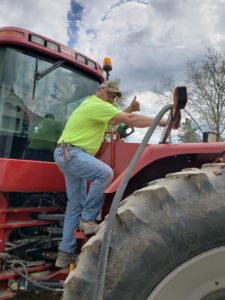
RENEE HANSEN: Welcome to the Premier Podcast, where everything agronomic is economic, and welcome to the series of our ‘Tractor Talks.’ This is part two of the series of Katie and Mike talking in the tractor as they are planting this spring. Follow along, and if you haven’t, check out episode one.
KATIE MCWHIRTER: So, it sounds like you trust it. You have very good, obviously, relationships with your agronomy team.
MIKE: Oh, yeah.
KATIE MCWHIRTER: That is important in any sort of business, to have teamwork.
MIKE: Totally. I think there are several people that you should have on your team that are a big asset to your success and your farm. I think, number one, is — well, I think there are several number ones — but that is your banker. Whether good or bad times, he needs to know what’s going on and vice versa. He needs to tell you what’s going on, whether you need to refinance something. Just have a good banker. I’ve been through several bankers in my lifetime, and my banker right now is roughly my age — two years older — and he’s awesome. He didn’t come from a real farming background. He’s more of a business banker, but he’s awesome. He is money smart where I am not.
KATIE MCWHIRTER: Right. That’s why you have him on your team. Because you’re not an expert in that.
MIKE: Correct. And he’s not an expert, in farming, on what I need to buy or what I need for a line of credit or something. And I think another person on your team you need to have is, unfortunately, a good lawyer.
KATIE MCWHIRTER: Yeah.
MIKE: Insert curse words there, but I think that is important to make sure you’ve got your rear covered in case something would happen.
KATIE MCWHIRTER: I’m looking right to the north here. And I just think: we sit in a pretty good county but between two counties that don’t necessarily like farming or aren’t educated enough.
MIKE: Correct. Farming’s evil. We dump everything in the river.
KATIE MCWHIRTER: Right. But we look at how close we are to town, and you’re right. There could always be that threat, legal-wise, and that sort of thing.
MIKE: Yes. Yes. And I don’t know — it’s not a list, but I think another number one is, of course, your family.
KATIE MCWHIRTER: Agreed.
MIKE: Communicate with your family. Hash everything out.
KATIE MCWHIRTER: Mike, I was riding with somebody this week, and he was telling me that he and his brother haven’t always gotten along. And they finally just had to have a ‘Come to Jesus’ meeting and be like: ‘Listen, if we’re going to make this work, we have to put aside our differences and learn how to live together.’ It seems like you and your brother have a very good relationship.
MIKE: We do. We do.
KATIE MCWHIRTER: And I’m sure you have your ‘times.’
MIKE: Oh, yeah. We have our times. If you don’t, let me know. If your family is all hunky-dory, unicorns and rainbows — really? No, it’s not. No, it’s not!
KATIE MCWHIRTER: Right. Nope. That’s good because, from a longevity standpoint…
MIKE: Right. Right. I mean, I’ve been here 20 years. I’ll be here in another 20.
KATIE MCWHIRTER: We hope so.
MIKE: Hopefully, maybe 20 after that. I don’t know.
KATIE MCWHIRTER: So, what do you feel is your biggest struggle within your operation? Or a struggle? Maybe I shouldn’t say the biggest, but what’s a struggle?
MIKE: Good question. I don’t know.
KATIE MCWHIRTER: Okay. I just kind of threw this at you, so I realize…
MIKE: No, that’s a very good question. I don’t know. The ability to — and it comes back to having somebody on your team that helps you with this — but to decipher information. Speak English to me. I don’t need a bunch of fluff. X equals Y on the radius of the…what? Tell me what it means in English. That’s my biggest struggle, to decipher information to — sometimes — to get this technology to work. Like last year, I was applying liquid manure through this monitor, the Pro 700, thinking I was making as-applied maps. Spent several thousand dollars for this equipment, and our tech guy at Case IH said: ‘Are you sure you were making maps last fall?’
KATIE MCWHIRTER: Oh no.
MIKE: I go: ‘Well, it was doing the color code on the Pro 700.’ Yeah, I can’t find your maps. Like, where’d they go? I don’t know. I’m like: ‘Oh, shit!’ So, we got just a few numbers, and that was it, over like 200-300 acres of liquid hog manure.
KATIE MCWHIRTER: You’ve come a long way, though, to map your manure.
MIKE: Totally!
KATIE MCWHIRTER: I mean, I’m thinking back…
MIKE: But I didn’t get information into here. Thought I was doing it on this little screen here, but — so, there again, try again next fall. So, okay, I’ll always sit down with it. I’m not going to be calling him every five minutes — I need you to come out, and they come to see if I got a map. So, I need to know: ‘Okay, I did this field. How do I know it made the map on the cloud, on a flash drive?’ Tell me how to do it, so I’m not bothering you when you’re knee deep in another guy’s project, and you get frustrated. And I get frustrated because we supposedly have this information, but nobody really knows if it’s there.
KATIE MCWHIRTER: And you’re right about the cloud, and that’s probably why, with your iPad and FieldView — I mean, you could see the map right away or in the Ops Center. Yep. And I know that Case has got a new program out. I don’t have a lot of experience with it, so I don’t know. But you’re right. It’d be nice if they all talk together.
MIKE: Right, right. But I need to know how to see if that information’s there, if that makes sense.
KATIE MCWHIRTER: No, it does completely. I think, from a couple standpoints, if you’re doing any sort of manure trials or leaving strips or anything of that — and I’m sorry. Again, back to ‘environmental’ and that sort of thing, to be able to prove what you put out and where you put it, I mean…
MIKE: Totally! Yeah, because we’ve got manure management plans for our hog buildings, and the DNR gives you no notice, basically. ‘Oh, hey, we want to come see your records.’ How soon? ‘Oh, within a couple days.’ Oh, really? Okay. But I always have a backup. I free-hand it, okay? We spread 200 acres here in town from a site. So, we have that information. We paid for that equipment. We paid for that equipment, and what’d we get right? Zero.
KATIE MCWHIRTER: Right. But you’re so different because I think there are a lot of people out there that they paid for this stuff. I mean, they bought it, don’t utilize it and it’s like: ‘Why?’ Why wouldn’t you use something you bought? Like, let’s buy groceries and just let them rot in the fridge.
MIKE: Right. Would you buy a pizza and not pick it up from the carryout? Just saying.
KATIE MCWHIRTER: Pizza does sound kind of good right now.
MIKE: I’d be there five minutes early, banging on the window. There again, it’s not hard labor. And another thing about that: you have to be here every day, whether it’s livestock, corn, soybeans, sunflowers, goats, whatever. Shit doesn’t get done if you’re not here.
KATIE MCWHIRTER: Well, it’s a business.
MIKE: It’s a business.
KATIE MCWHIRTER: And it’s no different than it is very hard to manage a business when you’re not there. I mean, yes, you can do some things from a distance, but as hands-on as farming is, you’ve got to be present. So, if you wouldn’t have become a farmer — this is one of my questions that I think is great. If you wouldn’t have become a farmer — come back to farm — what do you think you’d do?
MIKE: Shit hauler. Hands down!
KATIE MCWHIRTER: Really?
MIKE: A shit pumper. Yes. I absolutely love hauling shit. Absolutely love it.
KATIE MCWHIRTER: Which is funny because I love to do it too, but it was not the spreader that you have. So, why do you love to do it?
MIKE: Love my brother dearly. Love my family, but nobody bothers me. Put the pit in the pump, put the load stand up to the tank and haul shit. I’ll call you when I’m done and need help. And everybody just leaves me alone.
KATIE MCWHIRTER: So, it’s just your alone time.
MIKE: It’s just my alone time. I love doing it. I’ll run — not to blow my own horn — but I’ll do it all night. All day, all night. Give me a 12 pack, a 5-hour Energy and a drink. I’m good to go, and I love it. But looking back, here we are 40 years old. I would’ve done that, hands down. Hands down.
KATIE MCWHIRTER: It’s funny — and I’m looking out. We’re so close to town. What this will look like 20 years from now?
MIKE: Right. There’s the old calendar factory, where the Playboy calendars were made back in the day. What’s that? Changed hands three times probably?
KATIE MCWHIRTER: And that expansion — and there’s another one: the Dirtworks.
MIKE: Yup. You’ve got Walmart. The airport’s expanded like a family practice here.
KATIE MCWHIRTER: So, you’re going to have to be more efficient, raise more. I mean, raise more on less.
MIKE: Correct! Everybody’s going to have to.
KATIE MCWHIRTER: Do you use your data with livestock? I mean, the dairy industry is so good about data and technology, and I feel like pigs are so far — not so far behind, but…
MIKE: The dairy industry, you’ve got to remember, produces. Yeah, everybody out here produces a food product, but they are producing a very consumable product, if you will. I mean, everything’s got to be spotless. I mean, we don’t sanitize hog buildings after every pig eats the feed.
KATIE MCWHIRTER: Right. Nope. Nope, you’re right.
MIKE: I mean, I’ve been to a couple of dairies, and you talk about hard work. Those people — there is no rest.
KATIE MCWHIRTER: Yeah. I’ve never complained — okay, maybe a couple times complained about a gallon of milk, but I buy it, right? You don’t complain because these people work…
MIKE: Chocolate milk’s my best friend. My best friend! But those people, they get no rest. Back to their record-keeping technology, they’ve really evolved, in my mind. The hog industry has really evolved, in the last 20 years or more, with the advent of sow units. The consolidation.
KATIE MCWHIRTER: Yep. Well, they can sort pigs by weight now. I mean, there are those that are a little further along than others. I get that. Yeah. So, I shouldn’t have said that.
MIKE: But the days of having hogs outside are over. I got on the end of that when I came home from school 20 years ago.
KATIE MCWHIRTER: Oh, but geez — and those that still do it, more power to them for the niche markets, and that’s great. But, I mean, cold nights, rainy times, those pigs in the field, right? I mean, so that’s brought about good change. Good change.
MIKE: Correct. For labor, the environment, for everything.
KATIE MCWHIRTER: Right. But even this morning, when I was riding with you, I mean that’s technology, to have that cool bale unwinder.
MIKE: Bale processor, yeah.
KATIE MCWHIRTER: There we go. I mean, before, how would you have done it?
MIKE: Just take a bale out to the field, tip it on in, take the mail wrap off, go get another one, do the same thing. I think, back to the hog thing, the technology with — we’ve got alarms that’ll call your cell phone.
KATIE MCWHIRTER: For those that don’t know, why do they call your cell phone?
MIKE: In case the power goes out, high temp, water pressure goes down. Mainly if the power goes out because if the curtains are up, those pigs have minutes to live because it’s so airtight, they’ll suffocate. But then again, we got backup generators, which are pretty much mandatory for insurance reasons now. But the beef industry, I think, has — the technology is not there with confinement. I think they’re still trying to figure that out with air quality issues. Some people think they’re the greatest thing on God’s green earth. Some people build them, and they curse them because, in the winter time, it’s humid, and you can’t keep everything dry. It’s not a nightmare, but it’s a struggle. And I think — give it time, and people will have more of a refined building for beef production. But it’s come a long way, having calves in a 1912 barn that grandpa built. Hopefully, they do okay. So, yeah. That’s my two cents on it.
KATIE MCWHIRTER: And yeah, probably raised them that way. As you’re talking, I’m thinking — and they have, as far as genetics, embryos…
MIKE: That’s another thing.
KATIE MCWHIRTER: Those sorts of things, hands down they’ve done. Yeah, you’re right, and it’s an evolvement, right? I mean, the dairy industry didn’t magically overnight become what they are, and they were able to track each cow and how much milk and how much feed, right? But it’s so cool, though. And as I’ve ridden with some older farmers, one yesterday morning or two mornings ago, he was 70. I forget how many years — so, it was his 52nd crop he put in, and I’m like: ‘Think about how things have changed in 50 years.’ So, think about this, Mike. 20 years in. Go down the road another 30.
MIKE: Right. Crazy. I don’t know.
KATIE MCWHIRTER: I don’t know. I don’t know.
MIKE: I don’t know either.
KATIE MCWHIRTER: But exciting, right?
MIKE: Totally! Oh, yeah. You’ve got to stay on top of it. That’s another one of my struggles. We’re not going to use the latest and greatest technology for 1000 acres. I guarantee it. I mean, this is all used equipment we bought on AgTalk, that my brother bought on AgTalk.
KATIE MCWHIRTER: But you’re proof that you don’t have to have the latest and greatest too. I think part of it is I want to do a little bit better. We don’t have a bottomless wallet. So, how do we make the small changes to make the largest effect or have the largest impact on our own operations?
MIKE: And stay competitive. That’s what expansion is all about. It’s not, pardon my language, but having a big Peter contest of building hog buildings and renting ground. No, you’ve got to stay competitive, or you know what? You’re going to go to the end of the line. So, I don’t know. My brother probably sells around 30,000 head of hogs a year. When I came home 20 years ago, I don’t know if we’d sell maybe 5,000 a year. So, yeah, he’s put up hog buildings and expanded. And he’s got a family of five too. So, there are more mouths to feed. So, there again, everything’s relative. You’re not going to feed a family of seven on 5,000 head of hogs a year and expect things to work.
KATIE MCWHIRTER: I think that’s what people don’t understand. I think back 10 years ago, and they’re like: ‘Oh, they’re farming so many thousand acres.’ Well, right, but there are two brothers and a dad. That’s three families.
MIKE: Right, and we have neighbors west of town, in our neighborhood. I don’t know. There are dozens of mouths to feed there. And they farm 10,000-plus acres. It’s not because: ‘Oh, look at me. Look at me.’ Because they’ve got to support themselves. They’ve got to make a living.
KATIE MCWHIRTER: Right. I agree.
MIKE: So, everything’s relative.
RENEE HANSEN: Thanks for listening to the Premier Podcast, where everything agronomic is economic. Please subscribe, rate and review this podcast so we can continue to provide the best precision ag and analytic results for you. And to learn more about Premier Crop, visit our blog at premiercrop.com.
___________________________________________________________________________________________
- For more helpful tips and insight on all things data and agriculture, visit our blog at http://info.premiercrop.com/blog
- Curious about precision ag? Download our 5 Steps to Getting Started Guide: http://info.premiercrop.com/5-steps-guide
- Ready to cut through the bull? Download our No Bull Guide to Precision Ag: http://info.premiercrop.com/field-profitability-guide
- Podcast provided by Premier Crop Systems. Learn more about us at https://www.premiercrop.com

